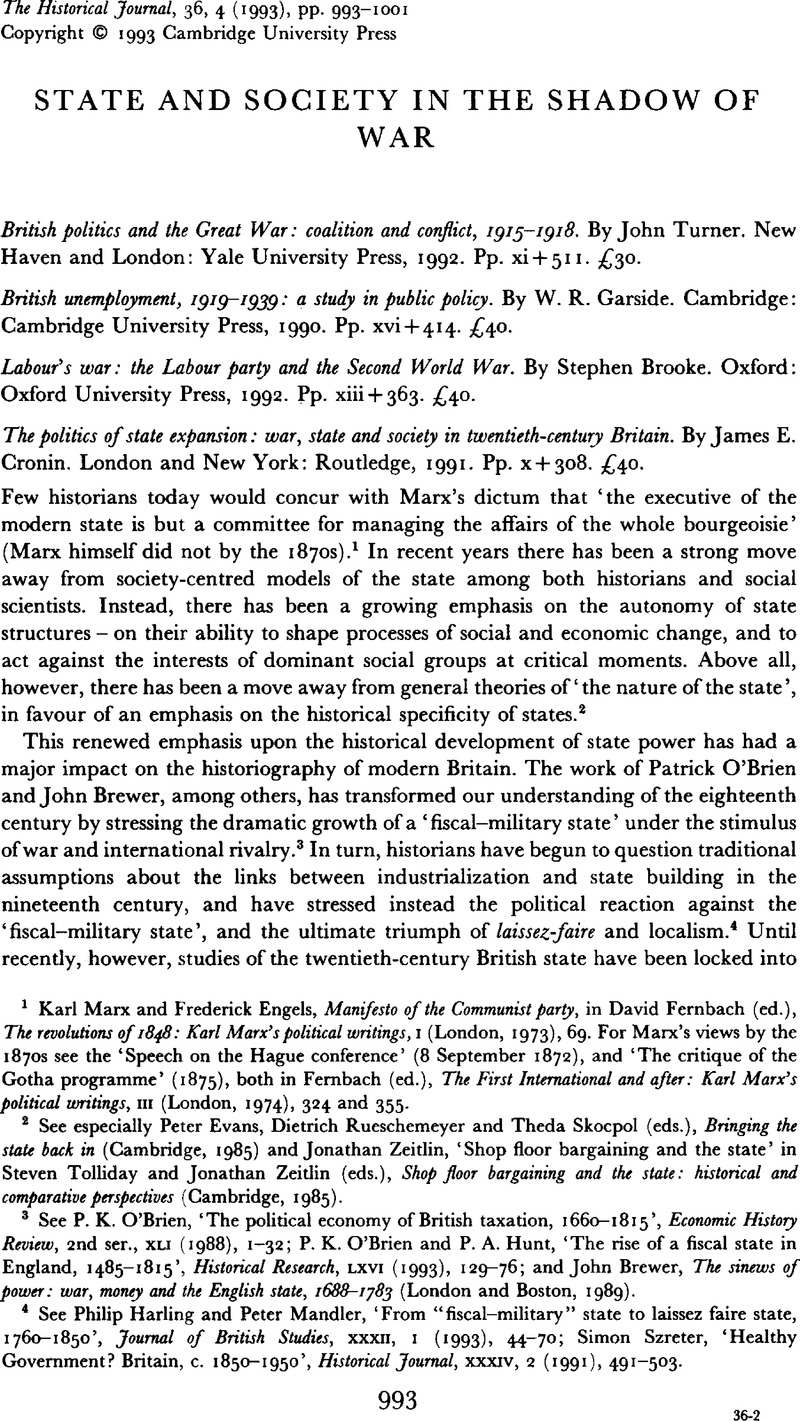No CrossRef data available.
Published online by Cambridge University Press: 11 February 2009

1 Marx, Karl and Engels, Frederick, Manifesto of the Communist party, in Fernbach, David(ed.), The revolutions of 1848: Karl Marx's political writings, I (London, 1973), 69Google Scholar. For , Marx's views by the 1870s see the ‘Speech on the Hague conference’ (8 09 1872)Google Scholar, and ‘The critique of the Gotha programme’ (1875), both in , Fernbach (ed.), The First International and after: Karl Marx's political writings, III (London, 1974), 324 and 355Google Scholar.
2 See especially Evans, Peter, Rueschemeyer, Dietrich and Skocpol, Theda (eds.), Bringing the state back in (Cambridge, 1985)CrossRefGoogle Scholarand Zeitlin, Jonathan, ‘Shop floor bargaining and the state’ in Tolliday, Steven and Zeitlin, Jonathan (eds.), Shop floor bargaining and the state: historical and comparative perspectives (Cambridge, 1985)Google Scholar.
3 See O'Brien, P. K., ‘The political economy of British taxation, 1660–1815’, Economic History Review, 2nd ser., XLI (1988), 1–32CrossRefGoogle Scholar; Brien, P. K. O' and Hunt, P. A., ‘The rise of a fiscal state in England, 1485–1815’, Historical Research, LXVI (1993), 129–76CrossRefGoogle Scholar; and Brewer, John, The sinews of power: war, money and the English state, 1688–1783 (London and Boston, 1989)CrossRefGoogle Scholar.
4 See Harling, Philip and Mandler, Peter, ‘From “fiscal–military” state to laissez faire state, 1760–1850’, Journal of British Studies, XXXII, 1 (1993), 44–70Google Scholar; Szreter, Simon, ‘Healthy Government? Britain, c. 1850–1950’, Historical Journal, XXXIV, 2 (1991), 491–503CrossRefGoogle Scholar.
5 On the state as agent of counter-revolution see Burgess, Keith, The challenge of labour: shaping British society, 1850–1930 (London, 1980)Google Scholarand Hinton, James, The first shop stewards' movement (London, 1973)Google Scholar; for a more sophisticated, and predominantly Gramscian reading of state responses to the rise of class see Langan, Mary and Schwarz, Bill (eds.), Crises in the British state, 1880–1930 (London, 1985)Google Scholar.
6 For instance, Middlemas, Keith, Politics in industrial society: the experience of the British political system since 1911 (London, 1979)Google Scholar; Marwick, Arthur, Britain in the century of total war: war, peace and social change, 1900–1967 (London, 1968)Google Scholar. For a radically different version of the society-centred approach see Perkin, Harold, The rise of professional society: England since 1880 (London, 1989)CrossRefGoogle Scholar.
7 Turner, , British politics, pp. 9–10Google Scholar.
8 Ibid. pp. 438–9.
9 Ibid. p. 10.
10 Ibid. pp. 8–13, 334–6 and 368–89. The main exponent of the ‘corporatist’ thesis is Middlemas, Politics in industrial society, but the approach also informs other major studies of Britain during the First World War including Rubin, Gerry R., War, law and labour: the munitions acts, state regulation and the unions, 1915–1921 (Oxford, 1987)Google Scholar, and Horne, John N., Labour at war: France and Britain, 1915–1987 (Oxford, 1991)CrossRefGoogle Scholar.
11 , Turner, British politics, pp. 336 and 389Google Scholar. See also his ‘“Experts” and interests: David Lloyd George and the dilemmas of the expanding state, 1906–19’ in McLeod, Roy (ed.), Government and expertise: specialists, administrators and professionals, 1860–1919 (Cambridge, 1988)Google Scholar.
12 Bowley, A. L., Some economic consequences of the Great War (London, 1930) p. 110Google Scholar.
13 , Garside, British unemployment, p. 43Google Scholar, see also pp. 57–8. The politics of unemployment, understood in the wider sense suggested here, plays an equally off-stage role in Rodney Lowe's otherwise impressive study Adjusting to democracy: the role of the ministry of labour in British politics, 1916–1986 (Oxford, 1986), pp. 132–90Google Scholar.
14 , Garside, British unemployment, p. 36Google Scholar.
15 Jefferys, Kevin, The Churchill coalition and wartime politics, 1940–1945 (Manchester, 1991)Google Scholar; Addison, Paul, The road to 1945: British politics and the Second World War (London, 1975)Google Scholar.
16 , Brooke, Labour's war, pp. 274–5, 287–92 and 295–302Google Scholar. See also his essay ‘Problems of “socialist planning”: Evan Durbin and the Labour Government of 1945’, Historical Journal, XXXIV (1991)Google Scholar and Durbin, Elizabeth, New Jerusalems: the Labour party and the economics of democratic socialism (London, 1985)Google Scholar.
17 See , Brooke, Labour's war, pp. 156–7Google Scholar.
18 Harris, José, ‘Political ideas and the debate on State welfare, 1940–45’ in Smith, Harold (ed.), War and social change: British society in the Second World War (Manchester, 1986), pp. 233–63Google Scholar.
19 Brooke, , Labour's war, p. 69Google Scholar (my italics).
20 , Cronin, Politics of state expansion, p. 2Google Scholar.
21 Ibid. p. 5.
22 Ibid. pp. 72–92.
23 Cronin notes that the roots of Labour's victory in 1945 lay in ‘shifts in public opinion, in popular expectations of what the state would do after the war’ (ibid. p. 151), but he does not examine the origins or nature of this shift in opinion.
24 Ibid. p. 14 (my italics).
25 The failures of government economic policy between c. 1955 and 1979 are discussed between pages 223 and 240, while the growth of state expenditure during the same period is briefly analysed on pages 241–7.
26 Ibid. pp. 17 and 245.
27 Townsend, Peter, Poverty in the United Kingdom: a survey of household resources and standards of living (London, 1979), pp. 218–23 and 964–79Google Scholar. Also Le Grand, Julian, The strategy of equality: redistribution and the social services (London, 1982)Google Scholar.